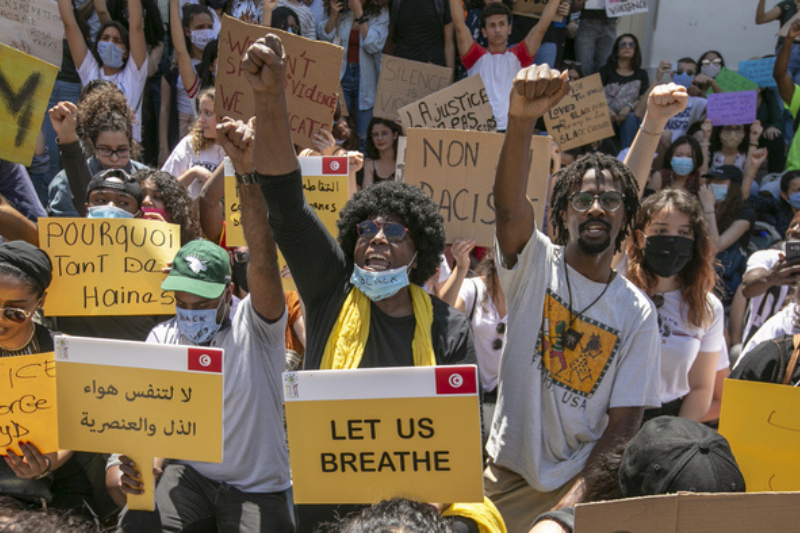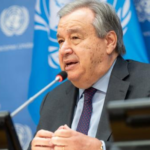
black skin or africans cannot breathe here tunisia crisis
Last updated on July 7th, 2023 at 07:02 am
The North African nation of Tunisia is bordered by Algeria, Libya, and the Mediterranean Sea. Despite the democratic victories of the Jasmine Revolution, which resulted in the overthrow of longtime leader Zine El Abidine Ben Ali in January 2011, Tunisia continues to face significant political and socioeconomic difficulties, with inflation expected to reach 10.2% in January 2023 and alarmingly high levels of food insecurity. Refugees and asylum seekers suffer as a result of these challenges. Meanwhile, the absence of a clear migration policy may have increased the risk of abuse and violence against refugees and migrants.
IMMIGRATION VIA TUNISIA
In Tunisia, the racism situation is getting worse. Black women in Tunisia claim that since the president of the country criticized sub-Saharan migrants, there have been more instances of racism. President Kais Saied allegedly ordered “urgent measures” against sub-Saharan migrants in February, accusing them of a “criminal plot” to alter the population makeup and cultural identity of the nation. A spike in racial tensions brought on by the murder of a local in Sfax has Tunisians targeting migrants from Sub-Saharan Africa.
As a primary route for refugees and migrants hoping to travel to Europe, Tunisia is quickly displacing Libya. Over 9,000 refugees and asylum seekers, mostly from the Middle East, sub-Saharan Africa, and the Horn of Africa, are currently registered with UNHCR in Tunisia. However, the actual number is likely much higher because many people are still not included in this figure.
The part played by the European Union in all of this should also be noted. Millions of euros have been given to Tunisia by the EU to “manage migration.” Tens of thousands of asylum seekers and migrants headed for the EU have been intercepted or saved at sea over the years by the EU-supported Tunisian Coast Guard, many of whom have left Libya. However, the nation still does not have a defined immigration policy, and no law regarding asylum and refugees has been passed.
These individuals frequently have no way to seek protection or acquire legal status in Tunisia because there is neither an official migration policy nor an asylum law. This has an impact on their access to housing and healthcare, legal documentation, opportunities for employment, education, and exclusion from their immediate environment. Key issues include trafficking and abusive smuggling methods. The few shelters that do exist deal with a wide range of problems, including overcrowding, poor sanitation, respiratory issues brought on by mold, and scabies outbreaks.
Keep Reading
CONSULTATIONS IN MEDICINE, SOCIAL WORK, AND PSYCHOLOGY
The La Goulette Reception, Care, and Orientation Centre (CASO) in Tunis was launched a year ago with the help of our partners.
CASO is a secure location where we provide medical-psycho-social care and referrals to more specialized services in Tunis for migrants and Tunisians without access to healthcare.
526 people—52% women (276) and 48% men (250)—have already benefited from various consultations since the program’s launch in July 2022 through last December. This includes 45 accompanied minors and 17 unaccompanied minors.
While 20% of those who have opened the center’s doors are Tunisians, the majority (80%) are migrants, primarily from the Ivory Coast but also from Cameroon, Sudan, Sierra Leone, and Guinea.
The majority of the center’s patients reside in shared or individual housing, frequently in precarious conditions; 5% live with friends or family; and 10% are homeless. By associations or organizations, only 6% are housed. Reintegration into the healthcare system is crucial in addition to housing and lodging because 56% of these people do not have health insurance.
Doctors of the World seeks to protect the rights of migrants and refugees in Tunisia and offer medical care. To ensure that respect for immigrant rights is ingrained in Tunisian society, we advocate with the authorities, organize training to improve the reception of migrants in public health structures, and raise awareness among the general public.
In light of reports of widespread sexual assault during Sudan’s war, the UN condemns both the humanitarian crisis and the crisis of humanity.









